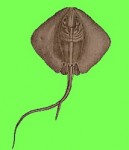Rays absent from Scottish shark survey
Sharkatag 2011 – Tope numbers down – no sign of cuckoo, blonde or spotted rays.
 June 2011. Are Scottish tope shark stocks in decline and will we ever see any rays again? These are two of the questions facing sea anglers and Scottish fisheries managers following last weeks Sharkatag, as, for the third year in a row, the numbers of tope caught declined and no rays, other than thornbacks, were caught.
June 2011. Are Scottish tope shark stocks in decline and will we ever see any rays again? These are two of the questions facing sea anglers and Scottish fisheries managers following last weeks Sharkatag, as, for the third year in a row, the numbers of tope caught declined and no rays, other than thornbacks, were caught.
Sharkatag, held annually in South West Scotland, is the premier shark tagging event run by the Scottish Shark Tagging Programme (SSTP – www.tagsharks.com). Last weekend, it once again received terrific support with anglers coming from all over the UK who fished from more than 50 boats and 20 kayaks.
According to Willie Kennedy of the Events Organising Team : “On Friday expectation was high, the weather was reasonable, the tides were right but in terms of the number of fish caught, it was quite disappointing; Saturday was equally difficult with the boats fishing off Ardwell having the most success; sadly the strong southerlies on Sunday made the day a washout – the first blown off day in the history of Sharkatag !
Tope numbers down – Cuckoo, blonde and spotted ray absent
Following an initial analysis of the data, Ian Burrett, the Scottish Sea Angling Conservation Network’s (SSACN – www.ssacn.org) Project Director highlighted a major concern :
“Evidence from this and previous years Sharkatags seems to confirm the anecdotal evidence that tope numbers are continuing to fall on an annual basis. We cannot be sure whether this is down to overfishing on their wintering grounds or a change in their Northern migration route due to some factor or another.
“Equally concerning is the data shows thornback ray stocks seem to be improving slightly, but not one cuckoo, blonde or spotted ray has been caught. Twenty years ago these species were abundant in the region – we need more research to find out why these fish are disappearing, but of course, funding is a major problem.”
